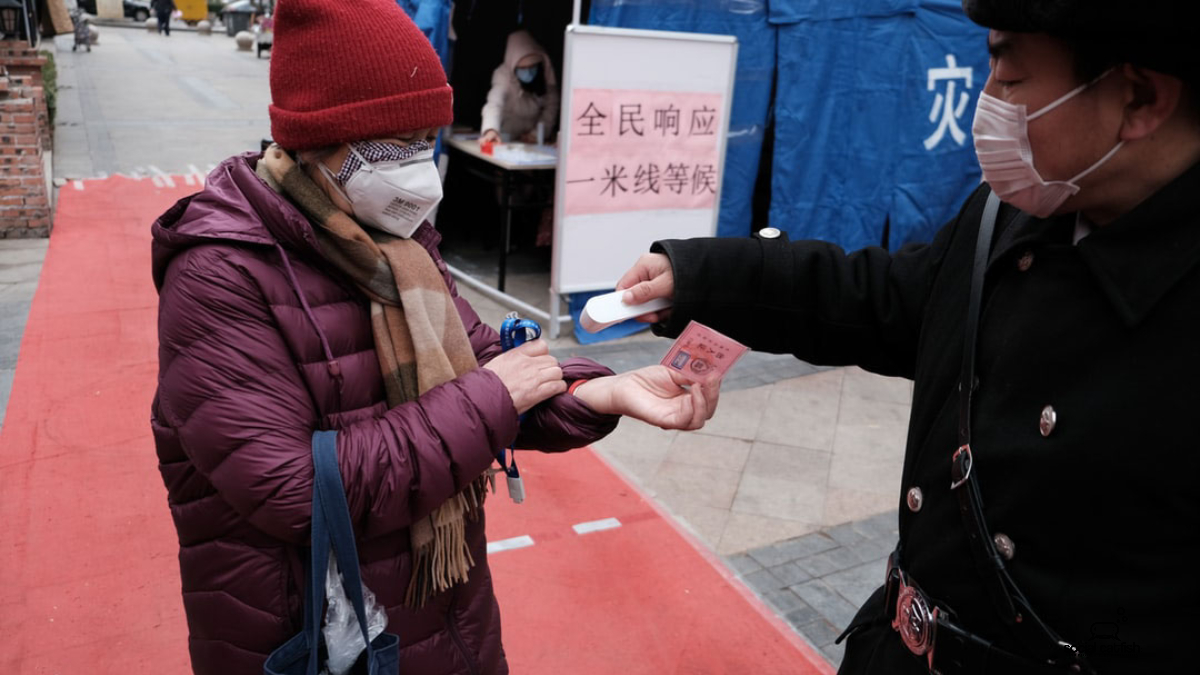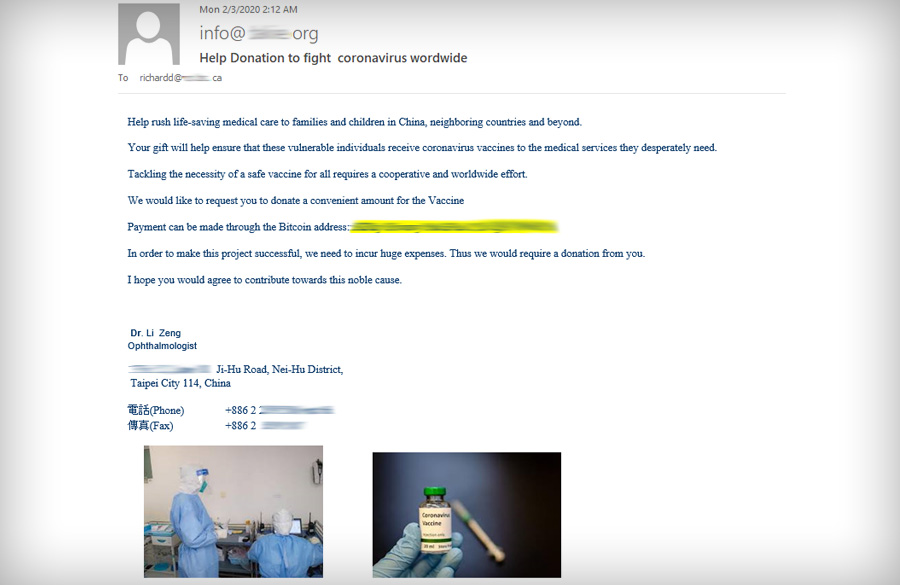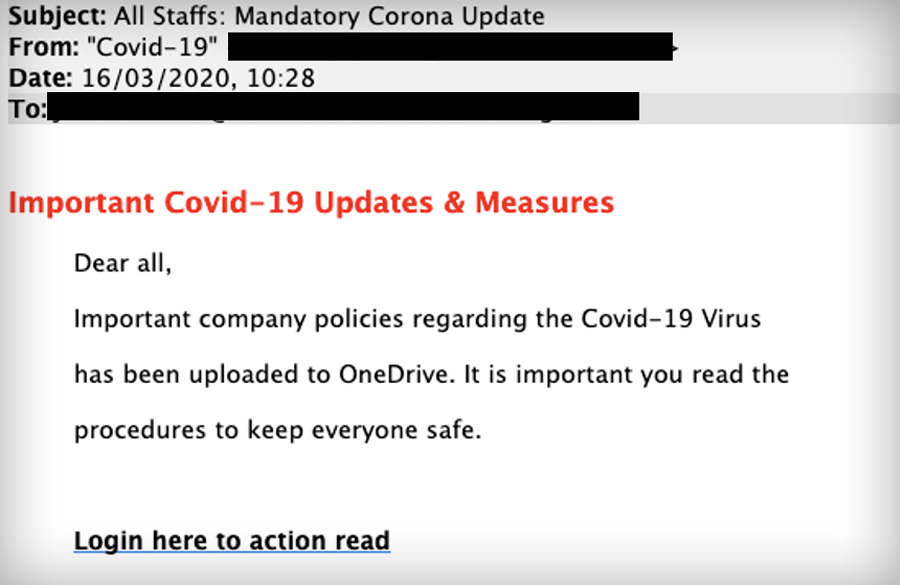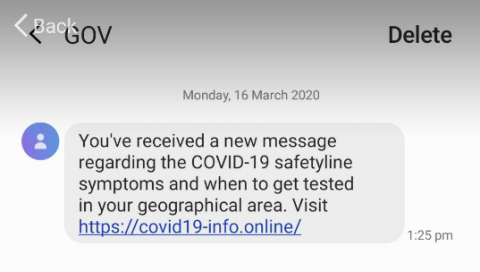
Hitting the breaking news recently, the coronavirus is slowly plaguing our planet with an incurable virus. It all started in China and has worked its way into other countries, including the United States. People who are healthy may not need to worry as much since it is more than likely you will recover from it. However, those who are older or with weakened immune systems do need to be more careful with this virus since there have been reported deaths.
While this is a serious issue, there are many people who are using this hard time in some people’s lives as a scamming opportunity. Many scammers know that we all want a cure to this virus, so they trick us with phony expensive cures to steal our funds.
However, we shouldn’t be as tricked since we have seen this with other viruses. For example, with H1N1 (swine flu), there were fake products that were released 48 hours after the news release of this virus to “treat” it. In reality, these products never worked. They were only made so that scammers could make money.
The FDA had to send out warning letters to companies making fake cures to stop making these unlawful claims and to remove these products immediately. Also for Ebola, people would make outrageous claims, like how dark chocolate or Nanosilver could supposedly cure this virus. For the Zika virus, they either had fake natural repellent sprays, wristbands, and even condoms.
While there have been scams with other viruses, there are still many types of coronavirus scams that occur. Even though some people are suffering from this virus, scammers don’t care about their victims, they care about getting their victims’ money! Here are the top four coronavirus scams that we should watch out for and how to avoid them.
Coronavirus Fraud Statistics
COVID-19 complaints by state
Since COVID-19 has become a global pandemic, many people have been facing more scams all across the country. These complaints received have been for fraud, disobeying the do not call list, identity theft, or other.
The top 5 states that have complained the most about COVID-19 scams are California, Florida, Texas, New York, and Illinois. Within these 5 states, the top complaint that most people were concerned about was coronavirus fraud. This means that scammers are most concerned with stealing money directly from their victims versus stealing their identities to get the money.
The lowest 5 states with the least amount of coronavirus complaints were North Dakota, South Dakota, Alaska, Wyoming, and Vermont. They also had more fraud more than anything else, which confirms that even in states with lower amounts of COVID-19 related scams, scammers will still do everything in their power to get their hands on your money.
Age and Fraud Complaints
The age group that is most targeted when it comes to COVID-19 fraud are 30-39-year-olds. This is because a lot of people in this age group are old enough to have money and their careers sorted out while also knowing the basics of technology. Because of this, this age group shops online and socializes on social media more-so while also having money, hence becoming the bigger target to scammers.
The age group that loses out on the most money in combined total with coronavirus scams are 50-59-year-olds. The age group that loses out on the most money individually with pandemic scams are people who are 80 and over. Scammers are likely to ask for more money from these individuals since a lot of them are more concerned with the coronavirus and are willing to do whatever it takes to protect themselves from it.
Total Top Scams
The top scams being performed throughout the nation are fraud scams, where scammers steal funds from their victims. The countrys being affected the most by the coronavirus scams is the United States, followed by France, Australia, Spain, and the United Kingdom.
The top products/services that have been affected by coronavirus scams are online shopping followed by travel/vacations, imposter businesses, internet information services, and romance scams. This is because people are wanting to shop online more often due to the coronavirus, and scammers know this so they target online shoppers.
The most money lost with people using these types of products/services due to COVID-19 scams are travel/vacations, followed by romance scams, online shopping, imposter businesses, and internet information services. This is because people are wanting to book vacations for after the coronavirus is over and know that the deals are too good to pass up right now, since no one is booking vacations.
Types of Coronavirus Scams

Robocall COVID-19 Scams
People have recorded robocalls about the coronavirus that have scammed random people into giving them money. According to Nomorobo, they pretend to be a variety of government agencies, hotlines, cleaning services, and even the show Storage Wars to get people’s attention.
These victims then trust that the person calling them is a legit representative for one of these organizations, which allows them to build trust with the person they are talking to over the phone. The voice recordings on the phone then ask to call another number which directs the victims to a scammer that asks for personal or financial information, or money.
How to Avoid: If someone is calling you claiming to be a part of an organization to help with the coronavirus, do not fall for this scam. The government and Storage Wars will not call random people offering cures or services in exchange for money. If there is a cure, it will be announced on the CDC, FDA, or WHO official sites. Hang up immediately if you receive these calls and don’t give out personal information or money.
Coronavirus Money Mules
Scammers are doing everything they can to get your financial and personal information to steal your funds, and even use you as a money mule for their schemes. Money mules are people who have been scammed into moving illegal money from one place to another through transfers, moving physical cash, or other various methods.
The most common ways they are able to use you as a money mule are through work-from-home scams or those who claim to be working overseas. They will usually ask you to deliver money from them to someone who needs the money, and in most cases that someone will “be battling COVID-19”.
How to Avoid: Don’t accept money from someone you don’t trust, or any suspicious transactions. If you don’t feel comfortable accepting money to take to someone else and it isn’t for a good reason, there is no excuse as to why you have to do that for someone. Block anyone who claims to be a work-from-home boss or work overseas that seems suspicious.
Blessing Loom Scam
The Blessing Loom scam can be seen in all its glory spreading around on Twitter, Facebook, and Instagram. Basically, what happens with this scam is someone posts a picture of an octagon shape called the blessing loom and everyone puts their names in the loom.
What happens from there, is the organizer gets 8 victims to donate $100 each toward the cause with a promise that they’ll get their money back, plus more. When the organizer gets the $800 dollars they were looking for, they disappear, leaving everyone without a single penny back. The entire thing is built on the promise that eventually, everyone will be a winner at some point.
What really happens is the organizer keeps the money that is given to them. Once a winner is picked, the scam continues over and over again with no one receiving any money but the organizer. Plus, their information is given to random people on social media which allows the organizer to hack their accounts and steal even more money. It is also illegal in certain states, such as Kansas.
How to Avoid: Don’t participate in any social media game that promises money in return. Chances are you won’t get your money back once you give it to the organizer of the game.
Netflix Passes
There have been Twitter users that claim that Netflix is giving out free passes to its users. These users then post a link with their tweets to click on in order to receive these passes, and tell their followers to “Hurry!” because “these offers won’t last long”.
Representatives of Netflix then went on their official social media pages to make sure their users knew that they were not offering promotions during the pandemic at this time, other than the free month trial users can get with their service. This just goes to show that this link only links to malware and a place to give out your information so that scammers can steal your funds.
How to Avoid: If you see anyone posting links offering up free offers during the pandemic, avoid clicking on these links unless you know it’s from the official site. Also, make sure you fact check those who give you this information by going on the official page or website yourself to see if this is really being offered. If it isn’t, then don’t believe any third party sources.
Census Stimulus Check Scam
Scammers are sending victims emails, texts, or instant messages claiming that in order to receive their stimulus checks, they need to complete the 2020 U.S. Census. According to the scammer, in order to complete this census, you need to click on the link they provide to fill out the information.
Once the victim clicks on the link, they receive malware on their device, and their information is stolen for the scammer to collect. With this information, they could commit identity theft on top of stealing your funds.
How to Avoid: The US Census will only send you emails if you have subscribed to them. Even if you did subscribe to them, you should still make sure that the information you’re being sent is from the official US Census. Do not click on any links from any email that claims to be the US Census, and only trust its official website.
Fake Coronavirus News
There are news sources out there with fake stories on what is being done about the coronavirus. Some news sources say there’s a cure to the virus while others are talking about fake add-on symptoms for the virus, and the list of fake news stories about COVID-19 goes on and on.
If you need to make sure a news source is correct on the story they put out, you can always go to coronavirus.org or usa.gov/coronavirus for more information on COVID-19. This is the legit government source on everything you need to know about this global pandemic.
How to Avoid: When looking at a news story, make sure it’s from your trusted news source and not from a random website. Also, make sure that the story has evidence to back up its claims and that the message makes sense.
Working From Home During the Coronavirus Scams
Since people have lost their jobs due to the pandemic, there has been a surge of people looking to get any type of gig they can to make that extra buck. Some have even resorted to looking for a job to do from home. However, this could be risky since scammers lurk work from home scams preying on their next victims.
Scammers are known to either have short work from home interviews over text messaging or long interviews where they take their client’s personal information, like their SSN or financial information. They then will offer paper checks with more than they offered their victims to work for them, and ask to give the extra money to them. These checks are fake, making victims owe their banks a ton of money if these checks go through.
How to Avoid: Don’t pay in order to pick up the job whether it be at the interview or afterward. Jobs are meant to help you earn money, so there should be no reason why you would need to pay for that work-from-home gig. Also, make sure the job listing is legit and research the position if it’s for a well-known company but not on its official website. Lastly, don’t pick up any “secret government” jobs because more than likely it’s a scam. The government won’t post secret job listings for the public to see.
False Coronavirus Cures
There have been many people selling fake cures for the coronavirus, and companies saying that their products help with COVID-19 when they don’t. These products range from colloidal silver, essential oils, gels, etc. that they claim work with the coronavirus. These are false claims made so that they can take your money for themselves.
The FDA can pursue criminal persecution on companies on the list if they don’t stop advertising their products as cures to the coronavirus. There is no known cure for this global pandemic yet, and if there was the government would announce it on their future websites.
How to Avoid: Do not buy anything from any company claiming that they can help cure the coronavirus unless you have your trusted doctor’s permission. The government will release the cure on their websites once they find one. Save your money and don’t waste it on fake coronavirus cures.
Stimulus Check Scams
There are scammers out there contacting their victims as the government/IRS in the form of texting, email, and phone calls telling them they have to follow certain instructions to get their stimulus checks. This includes clicking a link to go to a website with a specific form where victims then give the scammers their personal information.
With this information, scammers can then access the victim’s financial information and make themselves a stimulus check rather than giving a stimulus check to their victims as they promised.
How to Avoid: The government will give out stimulus checks automatically, so there is no need to do anything extra unless it says to do so on the official IRS website. Don’t click on any links claiming to help you get the stimulus check and don’t give anyone your personal and financial information.
Business Scams During the Coronavirus
In small business scams, scammers have gotten creative and come up with numerous ways to scam businesses out of their funds. They contact you via company emails or phone calls and pretend to be public health officials, the government, technology support, or the SBA to try and get private information from businesses.
With this information, they then try and steal your business’ hard-earned money, leaving no trace behind. This could happen via an online link where you enter your information, telling someone your information, or you willingly transferring the money to them for fake services.
How to Avoid: Don’t respond to emails or phone calls with requested personal information and don’t click on any suspicious links. Their emails could look legit, so it’s always a good idea to research the email further or meet with the client in person to discuss the information needed. Also, don’t believe in any fake paper checks that are sent to you and research them first before cashing them in.
SSA (Social Security Administration) Scams
Scammers are contacting people via phone calls pretending to be the Social Security Administration and are coming up with several excuses to try and steal your SSN and money.
They are using the coronavirus as an excuse to try and get your information, saying that they will send over your stimulus check if you would just provide them with the requested information. They will even say your SSN is suspended and threaten you give them the information to get it back, which is false as well.
How to Avoid: Caller ID isn’t always accurate, so do not fall for it even if the caller ID says it’s from the SSA. The SSA will not call you and you do not have a suspended SSN, and they will never threaten your benefits.
Remote Learning | Children’s Privacy | Child Identity Theft
Because of the coronavirus, many schools are providing children with distance learning opportunities since schools are closed. There are some parents who are concerned about their child’s online privacy because of this and want to make sure their children are safe from child identity theft. Child identity theft is when a child’s social security number or information is stolen to open up credit card accounts or apply for government benefits.
Websites and online services abide by the Children’s Online Privacy Protection Act (COPPA) which states that children need consent from their parents before personal information is collected from these sites if they are younger than 13-years-old. However, schools can act as parents and consent for children’s information to be shared as long as it’s for educational purposes.
How to Avoid: To avoid child identity theft, contact your child’s school to make sure that your child’s information is only being collected by trusted educational sources. However, be patient with schools because they probably have a high call volume due to the coronavirus. If you’re looking to use sources outside of their school to educate your child, look at each site’s information collection policy to make sure that your child’s information is safe with that site.
MLM (Multi-Level Marketing) Coronavirus Scams
Since so many people are out of work due to the coronavirus, MLM companies are trying to recruit people for their get-rich-quick jobs that require an investment in the company to get started. However, the FTC is telling people to research the company before investing money into it.
The FTC understands that more people will be looking into these companies because they got laid off, and therefore there will be a higher likelihood of these innocent individuals getting scammed. They also say to look out for companies that advertise natural cures to the coronavirus. These companies are falsely advertising these products since there’s no known cure to COVID-19.
How to Avoid: Do your research on the MLM company you plan on joining before committing to the company. This will allow you to make sure that this company’s intentions are good and that they are selling legit products, versus fake ones. This will also allow you to see if you will be paid a fair wage with a certain company.
Undelivered Goods During the Coronavirus
Scammers know that more people are online shopping due to the global pandemic, and because of this, they have developed the undelivered goods scam. This is when they sell something online and the victim purchases it, giving the scammer money.
Once the scammer has the money, they take it and never deliver what the victim bought. The products can range from cleaning products to health and medical supplies.
How to Avoid: If you bought something yet never received it, make sure you report it to the website right away if the seller is a third party seller on the site. If it’s the scammer’s website, report it to your credit card company so that they can dispute the charges on the merchandise you never received.
Fake COVID-19 Charities
Scammers take advantage of the good hearts that most people have when it comes to a global pandemic like this. They create fake charities that supposedly help with the coronavirus and ask these generous individuals for donations. These “donations” then go into the scammers’ pockets so that they can use the money for their own greedy purchases.
They can use fake emails and text messages to promote the charity to certain people and make the text or email look legit. That way more people would want to donate to them and not suspect that they are scammers.
How to Avoid: Do research on the charity you want to donate to and look for reviews on each certain one. These reviews will let you know if people have been scammed on the same charity you want to donate to. Also, look out for fake “thank you” letters via email or caller ID’s if they try to call you on your phone.
Phishing Scams Using Coronavirus Excuses
Scammers send fake emails and text messages to their victims, using different coronavirus related excuses to get them to click links sent to them. Once the victim opens the link, their device is riddled with viruses and convinces them to hand over their personal information. According to Scam Detector, some email examples these scammers use are coronavirus research where they are encouraging people to donate for them and pretending to be the government giving an update on the coronavirus. They also send texts to people about the coronavirus about when to get tested in the area.

Scam Detector
This information can lead scammers to perform identity theft scams where they can steal your money, open up credit cards, and sign up for government benefits. Phishing emails and text messages can be sent to one’s personal or business email address and phone numbers.

Scam Detector
How to Avoid: Do not click on any suspicious links emailed to you. These emails can look legit, which is why it is always important that you verify the email address, make sure it’s spelled correctly, and coming from someone you can trust.

Scam Detector
Family/Grandparent Scams
Grandparent and family scams often occur at night and target older adults. You will answer your phone and hear someone saying, “Grandma” or “Grandpa”. Maybe you’re a little tired, as it’s the evening and you don’t think twice when they ask you for a loan.
They’ll say that they’ve contracted the virus and are homebound and in quarantine. They will ask you to send them a gift card online, immediately, so they can buy delivery food or supplies. You’ll be upset and do so, without thinking twice. The caller will actually be a scammer and keep your money.
How to Avoid: Always check your caller ID to make sure it is actually your loved one calling you. If you feel like scammers are masking the caller ID to make it seem like it’s your loved one, call them back on their trusted phone number to confirm and verify it’s them. Don’t send money over the phone, even if it is someone you think you trust and always give it to them in person.
Quack Alert
You might love natural products, but if people are trying to sell you colloidal silver or aromatherapy to combat the virus, you’re being scammed. There are currently no viable antibiotics for the Coronavirus and natural products are not, in any way, proven to do the trick and fight this illness.
The FTC is compiling these fraudulent scams and products and has released a list. You might see these scam products shared on social media with testimonials or warnings about the disease, don’t fall for them and keep your money for items you might actually need if you’re sick (like tissues or face masks).
How to Avoid: Do not believe anyone who says they have found a natural remedy to cure the Coronavirus. Chances are they just want to sell you fake products so that they can take your hard-earned money to leave you broke and sick. The only ways to get better from the Coronavirus are to get rest, go to the doctor, and keep hydrated.
Fake Vaccine
You love your friends and family and don’t want them to fall ill. However, if you are asked to contribute to a fund to develop a vaccine to fight against Coronavirus, you’re being scammed!
You might even receive a “secret” call, email, or text about a supposed government vaccine that only you and a select few are privy to. If it sounds too good to be true it is, especially in regards to the coronavirus. Don’t give the solicitor your credit card information, or it will be compromised/stolen and used!
How to Avoid: Don’t listen to anyone who asks you for money over the phone, no matter what the excuse is! If someone you don’t know asks for money over the phone, chances are they are probably a scammer trying to steal your money. Hospitals and universities will be the ones to help fund vaccines and research to try and find a cure, and they won’t bug people on the phone to help them.
Fake CDC and WHO Emails
You receive a fake email which looks legitimate. It reads as if it was sent from the Center for Disease Control (CDC) or the World Health Organization (WHO). The email might link to a product that will “help you” However, the email is actually a scam and not really sent by the organization it appears to be from.
How to Avoid: Don’t click on any email that claims it has a product to help cure you of the coronavirus. The cure will be on legitimate news pages before an email gets sent out listing a cure for this illness. If you still aren’t sure of whether to trust the email, look at the “reply to” email address and all hyperlinks in the email. They will link you to outside websites that are not secure and can collect all your financial data or download malware.
Safety Precautions From the CDC and WHO

According to the CDC and WHO, to protect yourself you need to take safety precautions like washing your hands often and – especially – after you touch common surfaces (at home or in public). Avoid busy, large crowds, or touching your face, mouth, nose, and eyes when your hands are unwashed.
Dispose of used tissue and wipe down commonly used objects (door handles, etc.) with sanitizer. Face masks are most helpful if you’re the sick one (to avoid spreading the germs to others), not the one trying to avoid getting sick.
If you encounter a coronavirus scam, contact local law enforcement or file a complaint with the FTC. If your information was compromised (financial and personal data), check your credit report, and request a credit freeze.
While we shouldn’t panic, we can stay safe with good hygiene and remembering that most people stay healthy and recover fast, even from COVID-19. Do a reverse search on email addresses, usernames, profile images, phone numbers, and more at Social Catfish!


 September 28, 2023
September 28, 2023


















